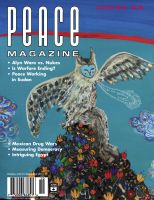
Peace Magazine Oct-Dec 2012, page 22. Some rights reserved.
Search for other articles by peacemag here
Scientist and eco-feminist Rosalie Bertell, who died at 83 in Langhorne, Pennsylvania, on June 14, 2012, had many titles.
She was a Grey Nun of the Sacred Heart, held a doctorate in biometry (statistical analysis of biological observations and phenomena), was an environmental epidemiologist and a world-renowned researcher in mathematics and nuclear science. As the “anti-nuclear nun,” she was a tireless activist on behalf of those most threatened by radiation: women and children, aboriginals and workers in uranium mines and nuclear facilities.
Rosalie Bertell was a frail child from her 1929 birth in Buffalo, N.Y. and knew early that she would become a nun. Her mother, a Canadian, inspired her activism, while her American father, president of Standard Mirror Co. (inventor of night mirrors for cars), encouraged her scientific abilities.
“My mother never celebrated the end of WWII. She kept saying over and over: ‘They shouldn’t have done it.’ I don’t know how she understood about the bomb, since no one knew at that time. It was her Irish sixth sense! My father opposed war and wouldn’t invest in uranium, as so many did after the war.”
After earning a BA in math/physics/ education from the city’s D’Youville College, Dr. Bertell joined the Carmelite community 1951-1956, leaving for health reasons. After serving on the faculty of Catholic University, Washington, DC, she entered the Grey Nuns of the Sacred Heart in 1958 and later received a master’s degree in mathematics/philosophy and a doctorate in mathematics/biology/biometrics.
In administration and on the faculty of Sacred Heart Junior College in Yardley, Pennsylvania for ten years, she taught at D’Youville Academy in Georgia, and came back to Buffalo to teach math for four years at D’Youville College.
In the 1970s, Dr. Bertell entered Buffalo’s Roswell Park Memorial Institute. That grew into a lifetime devoted to research, writing, public speaking and advocacy on the effects of low-level radiation on human health.
“I was a senior cancer research scientist studying the harm done to a large population by unnecessary uses of diagnostic medical X-ray. I became outraged when I found that nuclear power plants were releasing radioactive materials (like X-rays) at this same level routinely, indiscriminately exposing the unsuspecting public.
“My first experience was a nuclear plant which wanted to locate its facility next to the Gerber’s Baby Food Farm in Barker, New York. That plant was never built.”
Exhausted by a dual workload of teaching and research, Dr. Bertell suffered a second heart attack in 1972. During her convalescence she studied the atomic bombings in Japan. “I spent a year in a Carmelite Monastery looking at what we had done in Hiroshima and Nagasaki and the human dimensions of this catastrophe. I also prayed to know what small part I could play in helping to restore some humanitarian concerns to our society, which could so thoughtlessly wipe out 150,000 old men and women, mothers, and children.”
Armed with 10 years in radiation data, Dr. Bertell emerged as the foremost expert in the field. “Soon I was caught in the anti-nuclear network, and because I had a database of medical information, I was constantly asked to speak. I began to realize it was routine for the military to release radiation, and that it also set radiation standards.”
Appalled by the suffering from nuclear bomb tests of Marshall Islands’ residents, whose babies were being born without bones, Dr. Bertell took their case to the US Congress. But the Roswell Institute, which favored the nuclear industry because of its research funding, was putting pressure on her. Dr. Bertell recalled, “Scientists are economic prisoners. I was told what I could say, so I quit.”
As a dual citizen, she was able to move to Toronto, and for four years was the energy and public health specialist at the Jesuit Centre for Faith and Social Justice. In 1984 she founded the International Institute of Concern for Public Health in Toronto and traveled the globe, researching and advising on chemical and nuclear hazards that endanger the environment and erode people’s health.
In 1996, Dr. Bertell assisted Filipinos trying to cope with toxic waste left behind by the US Navy and Air Force on abandoned military bases; the US argued that the original 1940s contract specified no legal obligation to clean up this waste. After the 1991 Gulf War, she published a journal article used by ill veterans in obtaining recognition and compensation. She also served on commissions investigating the disasters in Bhopal and Chernobyl.
Rosalie Bertell authored two books, No Immediate Danger (1985) and Planet Earth: The Latest Weapon of War (2000) and more than 100 articles. She was featured in the National Film Board 1985 production Speaking Our Peace: Women, Peace and Power and a short prize-winning film on nuclear weapons testing in the South Pacific, Nuclear Addiction: Dr. Rosalie Bertell on the Cost of Deterrence.
In the 1990s she appeared in the film Exposure: Environmental Links to Breast Cancer. She also played an important role in the Magnus Issacson NFB film, Uranium.
Dr. Bertell received numerous honorary doctorates, was named to the Global 500 Roll of Honor 1993 (United Nations Environment Program), and in 1986 received the Right Livelihood Award, often referred to as the Alternate Nobel Prize.
Compiled with information from Wendy Jewell (ratical.org), the Grey Nuns and Mary Lou Harley. A 1985 interview is at peacemagazine.org/archive/v01n3p16.htm.
On Saturday, September 29, friends will remember Rosalie Bertell at Bloor Street United Church, 300 Bloor St. W., Toronto (St. George subway) at 7 p.m. The sponsor, the International Institute of Concern for Public Health, which Bertell founded, will gratefully accept donations.

Peace Magazine Oct-Dec 2012, page 22. Some rights reserved.
Search for other articles by peacemag here